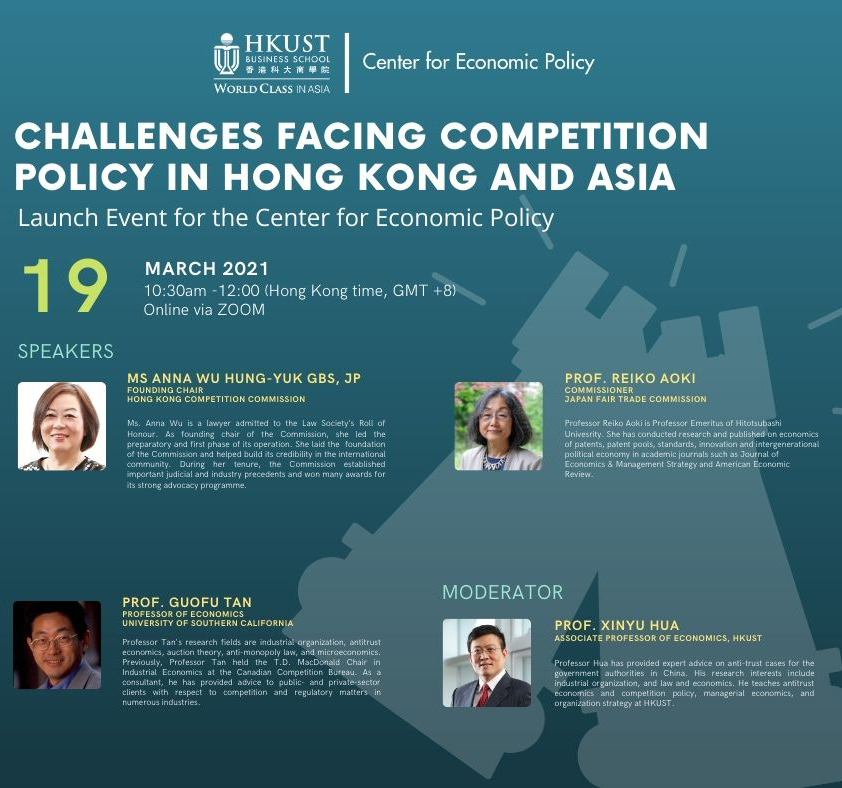Antitrust & Competition Policy
The antitrust and competition policy program focuses on the study of interactions of business strategies and market competition, as well as the impact of laws and regulations on competition, business strategies, and the general economy.

Photo by Edwin Andrade on Unsplash
| Publication
Corporate Disclosure as a Tacit Coordination Mechanism: Evidence from Cartel Enforcement Regulations
By Thomas Bourveau, Guoman She & Alminas Žaldokas
Mandated information disclosure of public listed firms in the financial statements increase transparency. However, transparency can come at a cost to consumers in product markets. Indeed, regulators have been expressing concerns about unintended product‐market consequences of increasing transparency in financial markets. The study examines empirically whether firms disclosure targeted at investors in order to coordinate actions in product markets

| Panel Discussion
Challenges Facing Competition Policy in Hong Kong and Asia
Date: 19 March 2021 (Friday)
Time: 10:30am-12:00noon
Format: Online via ZOOM
This is a panel discussion on challenges facing competition policy in Hong Kong and Asia. The event is a launch event for the newly established Center for Economic Policy (CEP).

Photo by lilzidesigns on Unsplash
| Working Paper
Merger Analysis in the App Economy: An Empirical Model of Ad-Sponsored Media
By Kohei Kawaguchi, Toshifumi Kuroda & Susumu Sato
This paper proposes a new model of imperfect competition of ad-sponsored media, which can sell "free" products, for a merger analysis applicable to the mobile app industry.

Photo by Tingey Injury Law Firm on Unsplash
| Working Paper
Settling Lawsuits with Pirates
By Xinyu Hua & Kathryn E. Spier
A firm licenses a product to overlapping generations of heterogeneous consumers. Consumers may purchase the product, pirate/steal it, or forego it. Higher consumer types enjoy higher gross benefits and are caught stealing at a higher rate. The firm may commit to an out-of-court cash settlement policy that is “soft” on pirates, so high-types purchase and low-types steal. This facilitates price discrimination. Firm profits rise if the firm bundles a license agreement with the cash settlement. However, requiring pirates to sign license agreements as part of the settlement has ambiguous welfare effects and may deter the entry of more efficient competitors.

Photo by Robert Anasch on Unsplash
| Working Paper
Search Algorithm and Sales on Online Platforms: Evidence from Food Delivery Platforms
By Sunny Yangguang Huang & Xie Yu
One prominent feature of online sales is consumers relying on the search tools offered by online platforms to process the gigantic amount of information on the platforms and search for products. These search tools such as search engines and recommender systems can potentially have anti-competitive impacts on the market by affecting the consideration sets of consumers. The study develops a model, using data from food delivery platform, showing how the search algorithm affects the market structure and welfare alongside with two other influences brought forth by online platforms: reducing search costs and increasing market participation.

Photo by Cytonn Photography on Unsplash
| Publication
The effects of global leniency programs on margins and mergers
By Ailin Dong, Massimo Massa & Alminas Žaldokas
The study investigates how staggered passage of national leniency programs from 1990–2012 has affected firms’ margins and merger activity. It found that these programs, which give amnesty to cartel conspirators that cooperate with antitrust authorities, reduced the gross margins of the affected firms. However, firms reacted to new regulations by engaging in more mergers that had negative effects on downstream firms. The results imply that although these programs were generally effective, their full potential was mitigated by mergers that substitute for cartels, and that a strong merger review process might be a prerequisite for strengthening anti‐collusion enforcement
